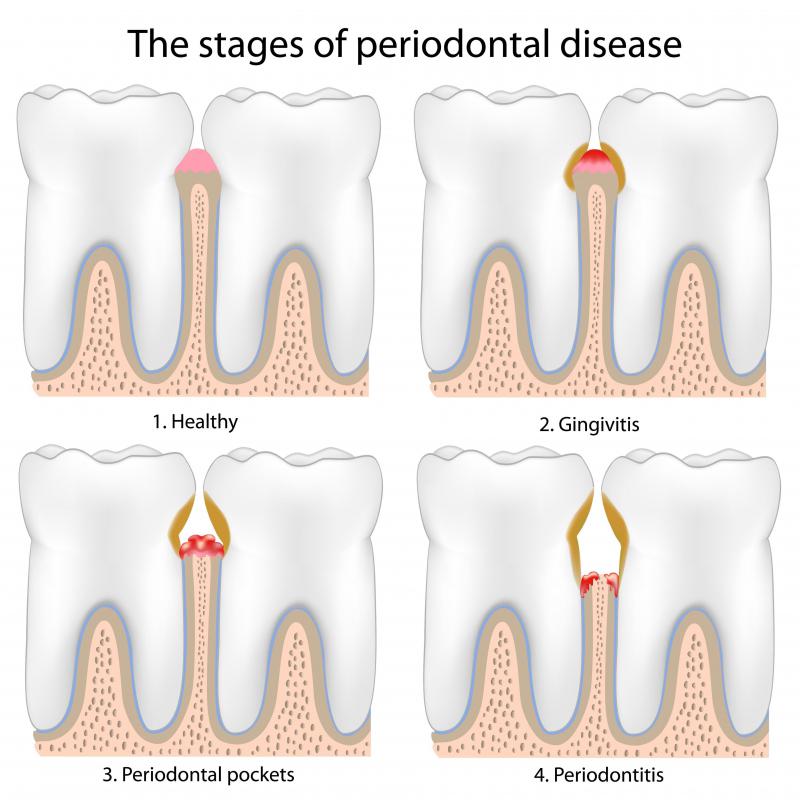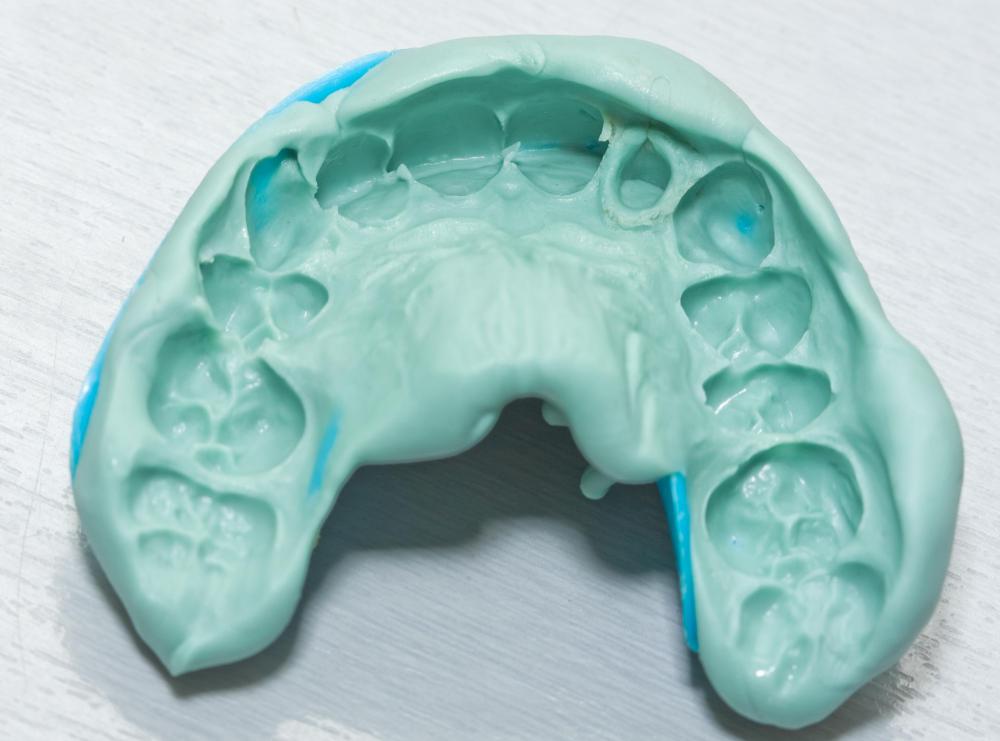At TheHealthBoard, we're committed to delivering accurate, trustworthy information. Our expert-authored content is rigorously fact-checked and sourced from credible authorities. Discover how we uphold the highest standards in providing you with reliable knowledge.
What are the Treatments for Loose Teeth in Adults?
Loose teeth in adults can happen for a couple of different reasons, and in most cases finding effective treatments is very closely related to figuring out what caused the problem in the first place. Gum disease and other mouth infections can cause looseness, particularly if the gums have begun to recede. Oral health specialists are often able to rebuild the base of teeth in these situations, which can help them tighten up again more or less on their own. People who grind their teeth may find that using a mouth guard, particularly at night, is the best treatment, whereas a person who has looseness as a result of an accident or trauma may need a temporary splint to help support healing and re-growth. In extreme cases, experts sometimes recommend surgery to improve the root structure, or implants if loose teeth look like they’re going to fall out. These solutions are usually considered last resorts and are very invasive.
Why Loose Teeth Happen

Loose teeth are often indicative of a serious dental issue in adults, and should usually be evaluated by a dentist or orthodontist as soon as possible to improve the likelihood of saving the tooth or teeth in question. Periodontal disease, which is also known as gingivitis, is the most common cause of loose teeth in adults. Gingivitis is a swelling of the gums caused by a build-up of plaque, a hardened coating of bacteria. If left untreated, the gums begin to recede and are no longer able to support the teeth, thus causing them to become loose.

People who grind their teeth are also at risk for looseness. Tooth grinding is known medically as bruxism, and is often something people do subconsciously — frequently in their sleep or in moments of stress or anxiety. Looseness can also happen as a result of trauma, usually when a person is struck in the face. Sometimes teeth are actually knocked out, and this requires its own sort of treatment in most cases. Simple looseness can often be healed, though it takes time and careful planning. The first step to effective treatment is diagnosing the problem, then charting out a way forward.
Scaling and Planing

Brushing and flossing at least twice a day are the best ways for most people to prevent gingivitis, but these methods aren’t usually enough to treat loose teeth once they happen. Scaling and root planing are two of the most common methods for helping strengthen the roots of teeth that have become weakened due to disease. Scaling is the process of scraping off the plaque at the tooth base and the root. Root planing, by contrast, is a deeper cleaning that removes a part of the dentin, or surface of the root which has been pervaded by the plaque. Both are normally done together in a dentist or oral surgeon’s office. If the patient keeps the teeth clean by regularly brushing and flossing after undergoing these procedures, the gums will in most cases heal and the teeth will tighten up within a few weeks.
Mouth Guards

Mouth guards are of the most common treatments for looseness caused by grinding. Mouth guards are generally soft, protective mouthpieces that encase the teeth to prevent contact between the top and bottom rows. These protective guards are usually available in three different types: stock mouth guards, boil-to-fit mouth protectors, and custom-fitted molds.

Stock protectors are the least expensive form of protection and typically come prepackaged with little room for adjustment. Boil alternatives are a little bit more customized. These protectors can be heated in hot water and then formed to the teeth by applying pressure. Custom-fitted mouth protectors tend to be the most effective, but they are also usually the most expensive, and in most cases have to be made by a dentist. First, an impression or model is made of the teeth and then the mouth guard is fitted to the impression. People suffering from chronic bruxism often find this option the most effective, and in these cases the investment is often worth it.
Splints

Loose teeth due to trauma are some of the hardest to treat, since so much depends on the extent and origin of the problem. In many cases, if the patient avoids the loose tooth while chewing and refrains from activities that may cause further injury, the tooth will tighten back up in a few weeks. If the blow is bad enough, though, a dentist may need to design a splint.

A tooth splint is usually made from a composite-resin material and wire, and it links the loose tooth to adjacent, tightly anchored and otherwise healthy teeth. This stabilizes the loose tooth while the gum tissue strengthens around the root. The length of time a splint must be kept in place varies, but is typically between a few weeks and a few months.
Surgery and Implants

Teeth that do not tighten up on their own or that don’t respond to splints, planing, and mouth guarding may need to be fixed surgically. Oral surgeons are often able to augment tooth roots from the inside, or they may recommend simply removing the problem tooth and replacing it with an implant. Implants usually look like real teeth, but are made of durable plastics or resins that screw into the jaw. Implants aren’t usually recommended unless loose teeth are a serious medical or aesthetic issue for a person, since the process is invasive and also typically quite expensive.
AS FEATURED ON:
AS FEATURED ON:


















Discussion Comments
It's all the chemicals in our foods that eat our teeth as we live on. Now there's no help for a rotten mouth of loose teeth. I'm going to get a string and some strong liquor for starters.
I've had eight teeth removed. Six the first and two the second. Now, a canine is loose. I don't think I grind my teeth. I'm told it'll tighten when my other teeth grow in, but it has been a few months now. Gingivitis is possible, but I doubt it. I mean, my dental hygiene isn't the best, but my gums aren't swollen or red. I'm scared it'll come out. Again, my mother tells me when the tooth grows into the socket beside it, the tooth will tighten. Please tell me this is true.
I just was dreaming about going to the dentist. I didn't know the reason behind going or anything, but when I woke up from my sleep because I felt like my tooth was in pain and felt loose. I went to the bathroom and flossed, but it didn't do a lot of good, though. I also brushed my teeth. I am wondering more and more if fluoride is actually good for your teeth? I use Crest Whitening, and I plan to switch back to my Sensodyne, which is what I was using previously. I have been under some stress, so maybe I was grinding?
I am very scared. I am only 26 and have a nice smile -- not perfect, but nice. I remember my dentist/orthodontist telling me they can't put braces on my front teeth due to knocking them loose because the roots of my teeth are very short?
I am so nervous. I am still very young. I never thought I'd have an issue like my teeth falling out, although I have had dreams about it.
@umbra21 - I can't wait for dental technology to hurry up and get to the point where we won't need loose tooth treatment or any other kind of treatment again, unless we have an accident. It's entirely possible that it could happen in our lifetimes. I've heard of research going on into bacteria that would live in our teeth and stop plaque from forming, for example. That would stop gum disease, which means we would probably not even need to brush.
@Ana1234 - Well, people have a vastly different diet today than they used to have and we also live a lot longer. There are animals out there who shed their adult teeth and grow another set, but usually they are animals who put huge amounts of pressure on their teeth. We don't really put that much pressure on ours, especially not these days. And with all the dentistry technology out there, there isn't a lot of selection pressure on us to be born with perfect teeth now.
If anything, there is selection pressure for us to have smaller jaws and heads, because it makes it easier for mothers to give birth. That's why people are often born with teeth that seem crammed together and have all kinds of problems with them.
I've read that flossing is the most important thing you can do to protect your teeth. I never used to floss when I was younger and I was always getting cavities even though I brushed regularly. Now that I try to floss every day, it's not so bad, although I suspect I'll have problems later on simply because there has already been damage done.
Apparently, if you aren't careful about brushing and flossing, you can end up with bone damage in your jaw. The idea of that really freaks me out, so I'm pretty careful. But I can't help but wonder why our teeth are so easy to damage. You would have thought we'd evolve past having such delicate things in our bodies by now. It just seems like loose adult teeth should be a selection pressure, since losing your teeth would be such a disadvantage for any animal.
Post your comments